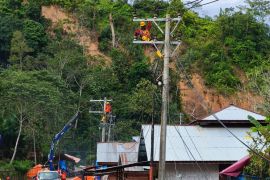The increasing price of soybeans, as a result of the rupiah`s depreciation against the US dollar, has forced many tofu and tempe producers to reduce their production or reduce the size of their workforce.Jakarta (ANTARA News) - Tempe and tofu (fermented soybean cake) makers in provinces across the country halted production on Monday to protest rising prices of imported soybean.
Following an appeal by the Indonesian Tempe-Tahu Cooperatives (KOPTI) and the Association of Tofu and Tempe Producers (Gakoptindo), they stopped manufacturing the popular side dishes.
The Gakoptindo announced earlier that its members would halt production from September 9 through 11 to protest sky-rocketing soybean prices.
"The increasing price of soybeans, as a result of the rupiah`s depreciation against the US dollar, has forced many tofu and tempe producers to reduce their production or reduce the size of their workforce. The aim of the protest is to warn the government and put pressure on it to address this matter immediately," Gakoptindo Chairman Aip Syarifudin said on Thursday.
Some traders at the Poncol Market in Kwitang, Central Jakarta, stopped selling tempe and tofu on Sunday because they ran out of stock before the date of their planned strike on Monday.
Customers who came to the Poncol Market in Kwitang on Sunday were disappointed after learning about that tempe is not available. "Customers keep coming here looking for tempe, but we have run out of it," said Dani, 32, a vendor at the market.
Tempe and tofu traders had previously received circulars from the Indonesian Tempe-Tofu Cooperatives (KOPTI), asking traders across the country to protest high soybean prices by not selling tempe and tofu.
Producers from at least five districts in West Java Province stopped distributing tempe and tofu on Monday. According to the local industry and trade office, tempe and tofu makers stopped production from September 9 through 11 to protest the hike in the price of imported soybean from approximately Rp7,000 per kg to the current Rp9,000-10,000 per kg.
"We have received an initial report that some five to six districts in West Java have run out of tofu," said Ferry Sofwan Arif, head of West Java`s Trade and Industry Office.
He said his office understood why the producers decided to call the strike.
"But they should pay attention to the fate of traders and workers if producers want to stage a strike," Arif continued.
He said the tempe and tofu industry would have to pay their workers even if they stopped production. Therefore, he expressed hoped that the strike would last no longer than a day.
"We hope they would stop production only for one day. Because people need tofu and tempe. These are popular side dishes," he added.
In Bogor City of West Java`s district town, not far from Jakarta, tempe and tofu disappeared from the local market on Monday.
The removal of tempe and tofu from circulation caused headaches to food stall owners and other eatery owners because they could not serve their customers tempe, believed to be the most popular type of food at the grass-root level.
"There is no stock of tempe and tofu today because producers and traders of the two commodities stopped producing it," Pak (Mr) Amin, a rice trader at the Surabaya food stall in Jalan Wemeru, said here on Monday.
On Monday, Amin only served lele (catfish) and a small piece of tempe he made from the previous day`s stock. He used to purchase tempe and tofu at the Anyar local market.
Because the Anyar market ran out of tempe and tofu stocks, Amin tried to find more at other markets, but failed. He said that the price of tempe this week had sharply increased, noting he previously purchased tempe at Rp7,000 per portion, but it had risen to Rp11,000. Tofu also increased from Rp2,500 to Rp5,000 and Rp7,000.
Meanwhile, KOPTI Chairman for West Java, Asep Nurdin, called on the public not to view negatively the action of tempe and tofu producers in halting production.
"Their action should not be viewed from negatively because they do it for the survival of their businesses. Soybean is expensive and they face difficulties in finding stocks," Asep Nurdin noted.
In Lebak District, Banten Province, some 250 laborers working for tempe and tofu producers have remained idle as their employers have shut down.
"We have recorded about 250 workers who are now unemployed," Head of Lebak District`s Trade and Industry Services Wawan Kuswandi said in Rangkasbitung on Monday.
He said he hoped the strike staged by producers in the districts would not last long, because it could have an impact on employment. "We called on producers and traders to halt activities for only three days," Wawan added.
A three-day tempe and tofu production stoppage took place in Kulon Progo District, Yoyakarta. In Tuksono Village tempe producers also halted production.
"We in Tuksono Village temporarily stopped tempe and tofu production. It is our consensus to hold a strike and put pressure on the government so that it would stabilize prices," said Ponimin, the group producers` organizer in the village.
He said that in Kulon Progo district there were 110 producers who employed 500 workers.
In the meantime, the tempe production stoppage in Surabaya, East Java Province, on Monday was marked by protests. A number of motorcyclists visited traditional markets to seize tempe and tofu they found on sale, throwing them away and even trampling on the food.
Edi, a tempe customer at Simo Market, said he was concerned to see a trader whose tempe was seized. "I am sad to see it. The assailants are also traders, aren`t they? Whey should they attack their friend? Who will compensate the losses he is suffering?" asked Edi.
Head of Surabaya Trade and Industry Service Widodo Wuryantoro said the assailants were anarchists. "I call them anarchists because they seize others` goods and trampled on them," he stressed.
Producers in Sumatra, such as in Lampung and South Sumatra, did the same as their colleagues in Java in stopping production.
Also, traders in a number of traditional markets in Bandarlampung, provincial capital of Lampung Province, halted selling the side dishes.
Tempe and tofu disappeared from such traditional markets as SMEP market and Tamin Wholesale market. "I first thought that tempe and tofu in Lampung would remain available because soybean prices here are not too high. In reality, however, it is just the same as in other provinces," Maya, a housewife, said in Bandarlampung.
In Palembang, capital province of South Sumatra, traders also began stopping production.
"Today, we temporarily stopped production because the price of soybean has reached Rp9,000 per kg. This has exceeded the profitable limit of Rp8,750 ," said Sumi, producer and supplier of tempe and tofu for Sekip Ujung market in Palembang on Monday.
The current price of soybean in Indonesia is around Rp9,000-10,000 per kilogram, an increase from the earlier price of about Rp7,000. This is partly due to the deprecation of the rupiah against the US dollar.
Also, the worldwide increase in the price of soybeans significantly affected the price at home, since about 70 percent of the country`s soybeans are imported.
Officials note that domestic production is only 700 thousand tons, while domestic demand has reached 2.5 million tons of soybeans per year.(*)
Reporter: Andi Abdussalam
Editor: Heru Purwanto
Copyright © ANTARA 2013











